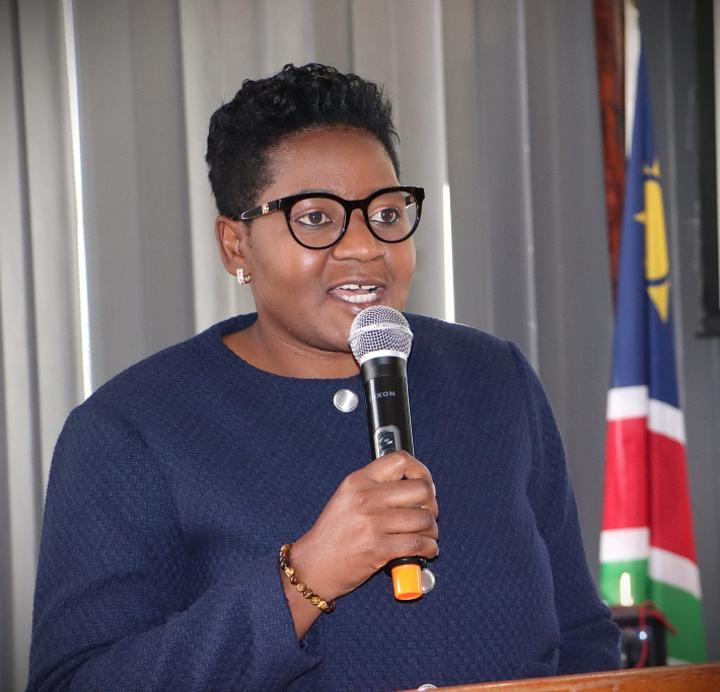Africa-Press – Seychelles. Namibia’s Minister for Gender Equality and Child Welfare, Honourable Dr Emma Kantema, has expressed concern over the declining number of women in the National Assembly and has called for urgent action to safeguard and strengthen gender equality in political leadership.
The minister made the remarks on Wednesday when she officially opened a capacity-building workshop for women in politics and decision-making in Swakopmund, Namibia.
She described the current representation of women in the National Assembly as a “call to action” rather than cause for celebration.
“Despite historic strides, including the election of our first female President, Vice-President, Speaker of the National Assembly, and Secretary to Cabinet, women’s representation in Parliament has declined from 53.2% in 2024 to just 38 out of 104 members today. This is not a mere statistic. It is a red flag,” she said.
Quoting American trailblazer Shirley Chisholm, Dr Kantema reminded delegates that women must assert themselves in leadership spaces.
“As Shirley Chisholm famously said, ‘If they don’t give you a seat at the table, bring a folding chair.’ You trailblazing women in this room are not here to simply occupy space. You are here to claim your rightful place,” she stated.
The minister applauded the convening of the workshop as a strategic opportunity to empower women leaders through mentoring, coaching, and skills development.
She stressed that women face distinct challenges in governance and leadership, which necessitates deliberate, inclusive spaces to reflect on and overcome those barriers.
The minister highlighted the need to mainstream Gender-Responsive Planning and Budgeting (GRPB) across all public institutions. She described GRPB as “not just a technical process, but a transformative tool” that ensures public resources respond equitably to the needs of women, men, girls, and boys.
“As women parliamentarians, you are uniquely positioned to support the ministry in advancing GRPB within your respective offices, ministries, and agencies,” she said.
She added, “Use your voices, your votes, and your influence to champion gender-responsive budgeting. Demand accountability. Insist on transparency. Advocate fiercely for policies and budgets that reflect the needs of women and girls.”
Dr Kantema welcomed the Electoral Commission of Namibia’s participation in the workshop. She described it as “crucial to sparking and sustaining the conversation on gender parity in politics”.
She urged all delegates to commit to transforming governance systems in ways that entrench gender equality and women’s empowerment.
“Let us leave this workshop committed not only to our own empowerment but to transforming the systems around us. Together, we can embed gender equality at the heart of Namibia’s development agenda. The future of our nation depends on it, and on us,” she said.
Speaking at the same occasion, the Speaker of the National Assembly of Namibia, Hon. Saara Kuugongelwa-Amadhila, also made a call to action for strengthening women’s leadership in governance and public life.
The Speaker emphasised that empowering women in political and decision-making roles is not a matter of favour, but of justice, equality, and national development.
“When women are appointed in public positions, this is not a favour done to them,” she said, “but a recognition of the tremendous value that women bring to society,” she stated.
She reminded participants of Namibia’s international and constitutional obligations to promote gender equality and uphold women’s rights. She cited the United Nations Convention on the Elimination of all Forms of Discrimination Against Women (CEDAW), the Universal Declaration of Human Rights, and Article 10 of Namibia’s Constitution.
“Women’s political participation and representation is not only a fundamental human right,” she stressed, “but is indispensable for democracy and sustainable development.”
While acknowledging Namibia’s historic strides, including having its first female President and strong female representation in cabinet, the Speaker warned that the proportion of women in the National Assembly has dropped from 50% in the 7th Parliament to 38% in the current 8th Parliament, with only 14% in the National Council.
“The emphasis should be to grow upwards, not downwards,” she said. “We must preserve our achievements and build upon them.”
She expressed support for the establishment of a Women’s Parliamentary Caucus, noting it could serve as a vital platform for ongoing capacity development and coordinated legislative influence on issues affecting women, children, and families.
The Speaker also highlighted persistent challenges such as gender-based violence, cyberbullying, and discrimination, and calledfor stronger legislation and reforms that create a more enabling and safer environment for women leaders.
She said, “As women, we face many challenges,” she said. “We must be conscious of these issues and collaborate with other women and with men to transform society positively.”
Touching on Sustainable Development Goal 5, which centres on achieving gender equality, the Speaker stressed that women’s empowerment is key to the success of Agenda 2030 and inclusive governance.
“The issue is not whether women are capable. The complexity lies in redressing entrenched, systematic discrimination and marginalisation… to translate women’s participation into critical influence and decision-making,” she said.
The Speaker concluded with a call for unity.
“Namibia is a great country. We need to take hands, pull together in one direction, and pave the way for generations to come. If we work hard, both men and women, Namibia shall continue to prosper and overcome these challenges,” she said.
The three-day workshop, hosted by the ministry in collaboration with International IDEA, brought together women members of Parliament, political party representatives, civil society, representatives of the SADC Parliamentary Forum and development partners to strengthen women’s leadership and political participation in Namibia.
For More News And Analysis About Seychelles Follow Africa-Press






